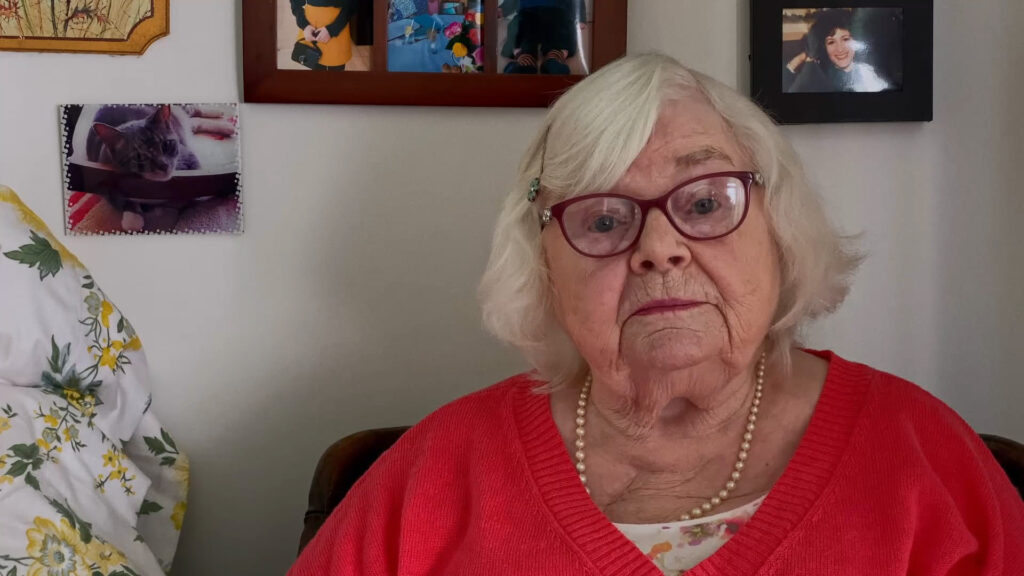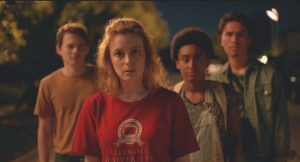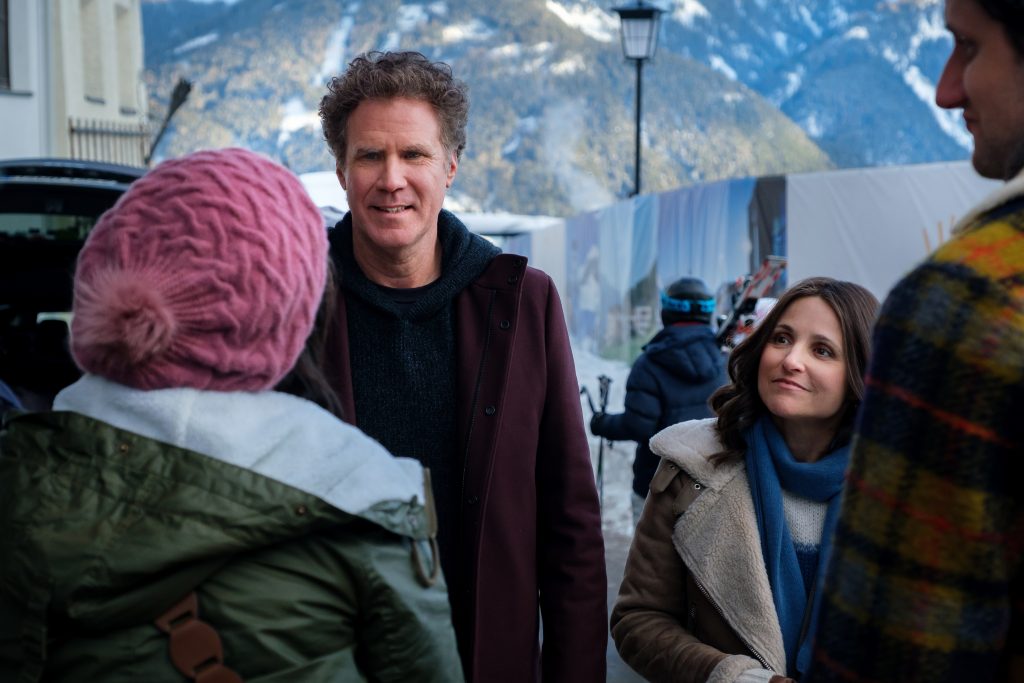April 7, 2022
by Carla Hay

Directed by Stephanie Laing
Culture Representation: Taking place in 2020, in North Carolina, New York City, Connecticut and other parts of the world, the comedy/drama film “Family Squares” features a cast of predominantly white characters (with one Asian and one African American) representing the working-class and middle-class.
Culture Clash: Before and after an American family’s matriarch dies, various members of the family meet on videoconference calls to talk about the clan’s frequently difficult relationships and some family secrets that cause conflicts.
Culture Audience: “Family Squares” will appeal primarily to people who are fans of the movie’s cast members and stories about bickering family members who still love each other despite their differences.

Neither terrible nor great, “Family Squares” is a flawed comedy/drama that’s elevated by the talent of the movie’s cast members. It’s an uneven but well-acted movie about a family gathering on videoconference calls. Directed by Stephanie Laing, “Family Squares” has a title that refers to how the family members appear on screen in squares because of the videoconference format. It’s another movie about people being unable to interact in person because of the COVID-19 pandemic. “Family Squares” (which Laing co-wrote with Brad Morris) won’t be considered a classic COVID-19 pandemic movie, but it might interest people who are curious to see a scripted story about how large families stayed in touch during the pre-vaccine lockdowns of the pandemic.
The movie, which takes place and was filmed in 2020, has the expected squabbles between these relatives, but there are enough tender moments and comedy to make the emotions well-rounded. Where the movie falters is in some of the dialogue, which can sometimes be too corny or too contrived. However, the cast members’ performances make the movie’s characters believable. You might see parts of yourself or people you know in some of these family members, even if what some these characters say occasionally sounds like an overly calculated movie script.
“Family Squares,” which centers on the fictional Worth family, could have done a better job of explaining in the beginning how each family member is related to each other. Unless you have an excellent memory or are taking notes, it might be very easy to get confused by the first 10 to 15 minutes of the movie, which is kind of a jumbled mess, where the characters show up on screen and then babble on about various things.
Here are the characters of the Worth family who participate in these videoconference calls:
- Mabel (played by June Squibb) is the family’s feisty matriarch, who is in her 90s and dying in a hospice/nursing home somewhere in New York state. Mabel passes away during the first videoconference call that’s seen in the movie. Mabel divorced her husband (who is now deceased) many years ago and has been married to a much-younger woman for the past four years. Mabel’s two children from her marriage to her ex-husband are son Bobby and daughter Diane.
- Judith Joyner (played by Ann Dowd), Mabel’s soft-spoken wife, lives in New York City, and has been unable to visit Mabel in person during Mabel’s final days because of the COVID-19 pandemic lockdowns.
- Bobby (played by Henry Winkler), Mabel’s bachelor son, has a rebellious past and a tense relationship with his younger sister Diane, who were both raised on a farm in Spring Hope, North Carolina.
- Diane (played by Margo Martindale), Mabel’s strong-willed younger child, doesn’t think highly of Bobby because she thinks he’s irresponsible and flaky. Diane, who lives in Connecticut, is a widow and a mother of five adult children: son Bret, daughter Dorsey, son Chad, son Robert and daughter Katie.
- Bret (played by Timothy Simons) is a widower and a failed business entrepreneur who is raising his daughter Cassie (who’s about 15 or 16 years old) on his own.
- Dorsey (played by Judy Greer) is a neurotic single mother who is currently on a road trip (in a recreational vehicle camper) with her reluctant 17-year-old son Max. Dorsey has a longtime love/hate relationship with her younger sister Katie. Max’s father, who is described as a deadbeat dad who abandoned Dorsey and Max, is not a part of Max’s life.
- Chad (played by Scott MacArthur), a bachelor with no children, is a fairly successful self-help guru and author, who thinks that he’s the one who has a life that is the most enviable out of all of his siblings.
- Robert (played by Billy Magnussen) is a ne’er-do-well bachelor with no children. Robert jumps from job to job and has a younger brother inferiority complex with Chad, who bullied Robert when they were children. Robert claims to be calling from Russia, where he says he is hiding out for top-secret reasons that have to do with Robert’s computer hacking.
- Katie (played by Casey Wilson) is the youngest of Diane’s children and the only one of her siblings to still live in their North Carolina hometown of Spring Hope. Katie is very image-conscious and has a bad habit of being tardy. Katie and her husband Kevin have three underage kids together, but Katie is the only one in their household who participates in the videoconference calls.
- Max (played by Maclaren Laing), Dorsey’s marijuana-smoking son, loves his mother, but he doesn’t want to spend a lot of time with her. Max was never close to his great-grandmother Mabel, so he is emotionally unaffected when Mabel dies.
- Cassie (played by Elsie Fisher), Bret’s quiet and introverted teenage daughter, was emotionally attached to her great-grandmother Mabel, so she is devastated when Mabel dies.
The movie’s unseen narrator is someone named Bill (voiced by Rob Reiner), whose identity is revealed toward the end of the movie. It might be easy to figure out who Bill is, based on his comments and observations. Some viewers might think the narration is unnecessary and annoying, while other viewers might think the narration is necessary and charming.
Someone who pops in occasionally during these videoconference calls is Kelly (played by Zoë Chao), the hospice nurse who was taking care of Mabel before Mabel passed away. Kelly is the one who sets up the videoconference call for Mabel, who is computer-illiterate and too sick to do it herself. After Mabel dies, Kelly plays video messages that Mabel left for her surviving family members.
Kelly has an awkward moment with Judith when, after Mabel dies, Judith wants to arrange to get Mabel’s personal items that were at the hospice, but Judith is not allowed to claim Mabel’s items. Kelly has to tell Judith that it’s because the hospice doesn’t have Judith listed as a family member, even though Judith and Mabel were legally married. This scene is a depiction of what LGBTQ people often have to go through when their spouses or partners die, and the spouses or partners who are left behind are impeded by homophobic policies and laws that deprive them of their rights. All of the members of the Worth family love and accept Judith, but the movie never bothers to explain why Mabel—who knew she was dying and was living openly as a queer married woman—never made the proper spousal arrangements for Judith at this hospice.
Another person who is part of these videoconference calls is a funeral director/attorney named Alex (played by Sam Richardson), who is put in an uncomfortable position when the Worth family members disagree over whether or not to have a virtual/online funeral for Mabel. Judith is a part of these funeral arrangements. And the decision about the funeral isn’t the only conflict in this family.
Mabel drops two bombshells in her farewell videos that are shown after her death: First, she announces that somewhere on the family farm property is something valuable. “We are really, filthy, stinking, fucking rich,” Mabel says in the video. Some of the family members immediately want to go to the property to hunt for what they think might be hidden treasure and possibly find it before the other family members. Bill can be heard in a voiceover saying, “Nothing like an inheritance to get the family greed boiling.”
Mabel’s other shocking revelation is that she says one of the family members who is a sibling is actually not a biological sibling. Mabel refuses to go into any further details and tells her family members that they have to figure out this secret on their own. This family secret actually makes “Family Squares” more interesting than it could have been, so it’s one of the main reasons why the movie can hold people’s attention.
There are other family secrets that are revealed during these calls, but they are somewhat mild in comparison to the one about who are the real biological parents of the person who’s “not a sibling.” There’s also the matter of who else in the family knew about this secret, which could threaten to destroy relationships in this family. Judith admits she knows the secret, but she tells everyone: “It’s not for me to say.”
In a movie with very talented cast members, it’s hard to go wrong with their performances. Greer and Martindale stand out the most because not only do their characters of Dorsey and Diane have outspoken personalities, but they also have the most emotional depth. All of the other cast members perform well in their character roles, which at times can get a little two-dimensional and can reduce them to stereotypes.
Laing gives mostly solid direction to “Family Squares,” which could have done without some of the slapstick shenanigans between Chad and Robert that cheapen the quality of the film. A few of the characters, such as Cassie and Bret, are a bit underdeveloped. Because there are so many family members and so many conflicts, at times “Family Squares” seems a little overstuffed. The first third of the movie tends to drag, the middle of the movie is a little scattered and unfocused, but the last third of the movie makes up for the story’s shortcomings.
Screen Media Films released “Family Squares” in select U.S. cinemas, on digital and VOD on February 25, 2022. The movie was released on Blu-ray and DVD on April 5, 2022.










